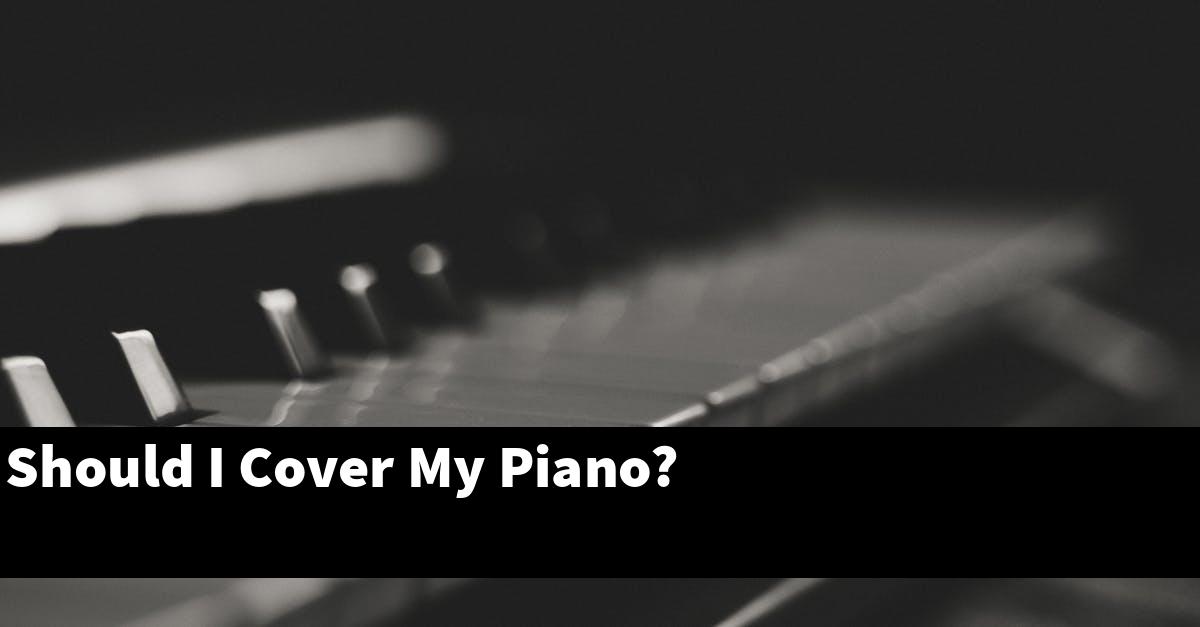It depends on a number of factors, such as the size of the piano, the climate in which it will be used, and the particular style of music being played.
In general, though, it is a good idea to cover the piano if it is not being used for regular play. This will help to protect it from weather extremes, and may also help to preserve the piano’s finish.
The most important thing to consider when covering your piano is to make sure the covering is durable and will not cause damage to the instrument. There are a number of different types of coverage that can be used, and it is important to choose one that is specifically designed for covering pianos.
If you’re not playing the piano regularly, is it necessary to cover it?
One of the most frequently asked questions about piano care is whether it’s necessary to cover the instrument. Although there is no definitive answer, here is a detailed professional explanation of the topic.
First, it’s important to understand that the cover does not actually protect the piano from damage.
In fact, if the cover is not securely attached, it can actually cause damage to the instrument. Instead, the cover serves two important functions: it protects the instrument from dust, dirt, and other debris, and it provides a warm and humid environment for the piano.
Dust, dirt, and other debris can cause damage to the finish on the piano, as well as the strings and other components. In addition, the cover can create a moist environment that encourages the growth of mold and other pests.
Finally, the cover can block out sunlight, which can damage the wood in the instrument.
To ensure that the cover is protecting the piano the right way, it is important to attach it securely. There are a number of ways to do this, including using screws, bolts, and clamps.
In addition, it is important to make sure that the cover is clean and free of debris before attaching it.
Overall, it is important to keep the piano clean and free of debris, and it is also important to attach the cover securely. However, there is no need to cover the piano all the time. In fact, it is often recommended that the cover be removed during periods of mild weather.
If you’re covering your piano for protection, is it necessary to use a heavy cover?
Heavy covers are not necessary for covering a piano. A light cover will do just fine.
If you’re covering your piano for aesthetic reasons, is a light cover enough?
There is a lot of debate raging over whether or not covering a piano is necessary for aesthetic reasons.
Some people feel that a light cover is enough to keep the wood looking beautiful, while others feel that a heavy cover is necessary to keep the instrument in good condition. A professional luthier can give you a more accurate opinion as to whether or not a cover is needed.
If you’re covering your piano for sound-related reasons, is a thick cover necessary?
A thick cover is not necessary for sound-related reasons, but it can make the piano-less susceptible to dust and debris. A thin cover will not provide enough protection and will eventually wear out.
How do I protect my piano?
Pianos can be damaged by a wide variety of things, from dust and scratches to water and fire. While there is no one foolproof way to protect a piano from all damage, there are a few simple steps that can be taken to help minimize the chances of a damage happening in the first place.
One of the most important things to do is to keep your piano clean. Not only will this help to prevent dust and dirt from accumulating, but it will also help to keep the piano’s wood from becoming damaged. Regularly cleaning the piano with a mild soap and water solution will do the trick.
Another important step is to keep the piano safe from water and fire. If your piano is located in a high-traffic area, be sure to put up a fire alarm and/or a sign warning people not to enter if there is water or flames in the vicinity. Additionally, be sure to keep all cords and cables away from water and fire, and to never leave a burning candle or cigar on or near the piano.
In addition to these simple precautions, make sure to have a qualified piano technician give your piano a tune-up every year or two. This will help to ensure that the piano is in good working order and is not susceptible to damage.
What do you cover a piano with?
Piano covers are a type of protection for the piano. They can be made from a variety of materials, including cloth, felt, or vinyl. They can be colorful or plain, and can have a variety of designs. They can also be designed to protect the piano from dust and dirt, and from scratches and dents.
Conclusion
Pianos should be covered when not in use in order to protect them from damage. There is no need to use a heavy cover, but a light cover is generally sufficient. If you’re covering your piano for aesthetic reasons, a professional luthier can give you a more accurate opinion as to whether or not a cover is needed.


